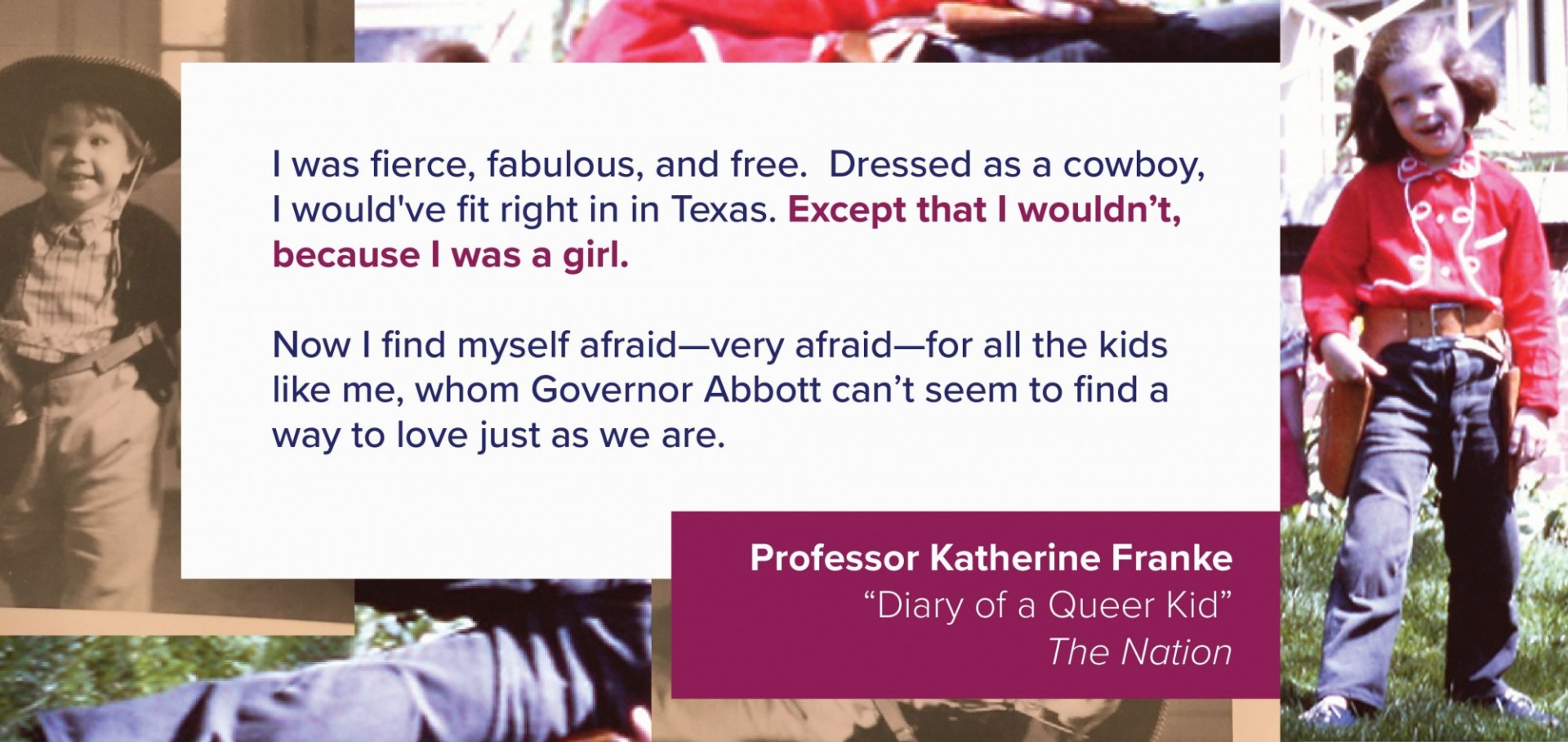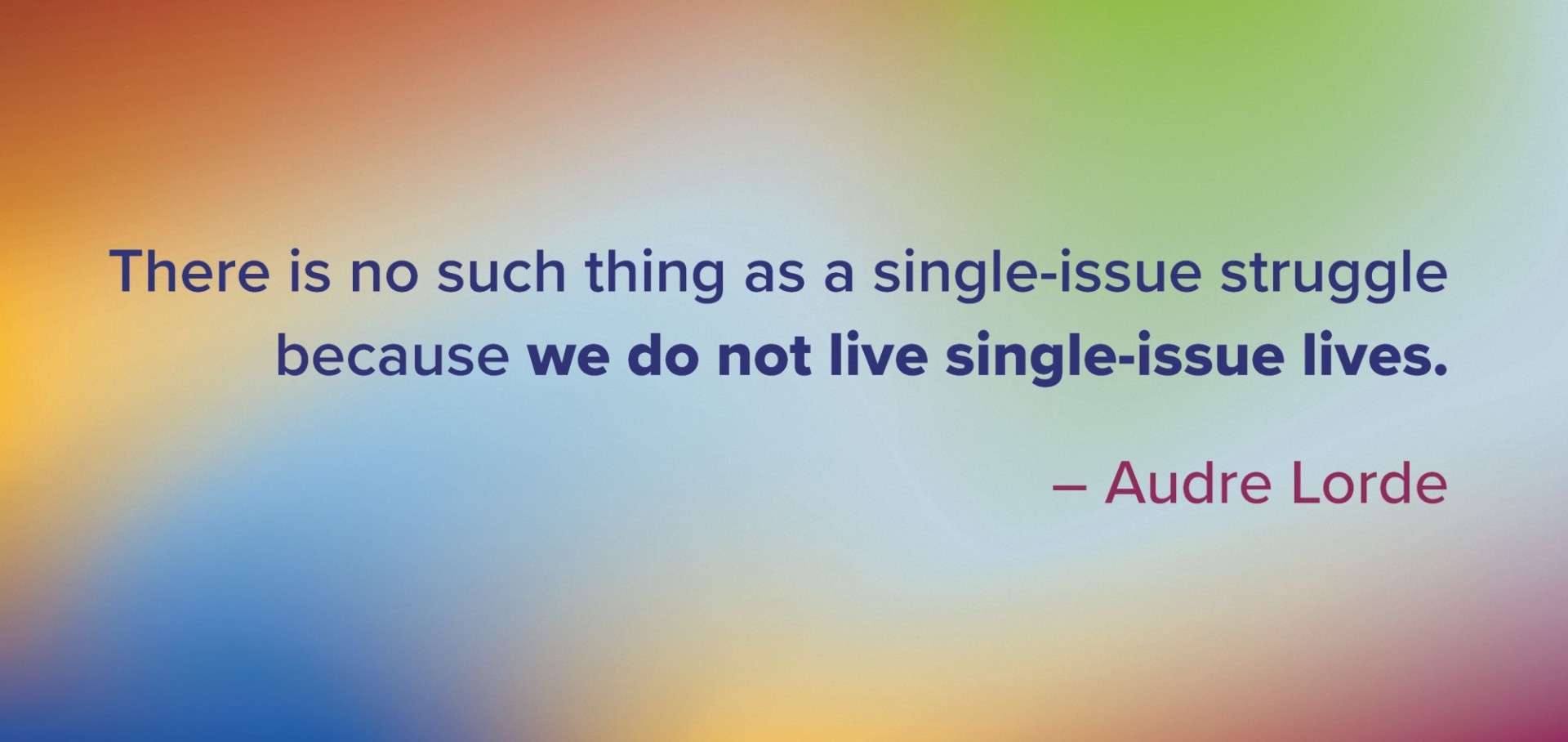Pride Month at the Center for Gender & Sexuality Law
At the Center for Gender and Sexuality Law we work at the intersections of LGBTQ+ equality and gender justice, reproductive justice, racial justice, and religious freedom. This Pride month, as we face an onslaught of painful attacks on LGBTQ+ communities in statehouses and courthouses nationwide, we want to take a moment to share a deeply personal piece from our Director, celebrate queer people who fought (and are still fighting) for their religious freedom in court, and highlight the possibilities that the Equal Rights Amendment (ERA) holds for protecting LGBTQ+ rights in the U.S.
Diary of a Queer Kid
The Center for Gender and Sexuality Law’s Director, Professor Katherine Franke, wrote a deeply personal and moving piece in response to Texas Governor Greg Abbott’s order to state agencies to investigate gender-transitioning procedures as “child abuse.”
“When I was a little girl, I was one of the boys. We ran, jumped, and huddled together, while the girls did their thing somewhere else…I had a nom de guerre: Kurt. Kurt showed up every morning ready for fun with the boys, flipped through my dad’s Car and Driver magazines, and wrote to Valvoline, Sinclair, and STP asking if they’d send me stickers. Incredibly, they did.
As I watch what’s going on in Texas, where a new state policy prohibits parents from affirming their kids’ trans identities at the risk of being labeled “abusers,” I shake in horror. Kurt shakes in horror.”
Read “Diary of a Queer Kid”
Five Times LGBTQ+ People Fought for Their Religious Freedom
LQBTQ+ equality and religious freedom are inextricably linked. While these two fundamental rights are often seen as in conflict, the truth is that people’s ability to live as their authentic selves—in both body and soul—requires freedom from persecution on the bases of sexual orientation, gender identity, and religious belief. Religious liberty is an essential right for all LGBTQ+ people, including those who identify with a particular religious tradition, those who are nonreligious or have experienced religious trauma, and those who are carving out their own unique spiritual path.
Click below to learn about five court cases where LGBTQ+ people fought for their faith freedom.
Read “Five Times LGBTQ+ People Fought for Their Religious Freedom”
The text of the Equal Rights Amendment reads: “Equality of rights under the law shall not be denied or abridged by the United States or by any state on account of sex.” If finally ratified as the 28th amendment, the ERA would add specific sex equality protections to the U.S. Constitution. While the words “sex” and “sex equality” do not appear in the text of the current Constitution, amending it to include specific sex equality protections would both clarify and strengthen existing constitutional prohibitions against sex discrimination, and would include protections against sexual orientation and gender identity discrimination.
Additionally, a new explicit constitutional equality right would anchor the right to same-sex marriage recognized in Obergefell v. Hodges, and immunize marriage equality rights from reversal by the Supreme Court.
To learn more about the ways in which the ERA can protect LGBTQ+ rights in the U.S.:
Read the ERA Project’s policy brief.
Protecting Queer Youth: Why Title IX is Not Enough, But the ERA Is!
“The threats that queer folks face, especially trans and nonbinary youth, will not be permanently fixed by Title IX. Further, Title IX does not address issues outside of school, such as access to gender affirming care. The ERA, however, would require all government actors to enforce equality for all legal rights.
The Center for Gender & Sexuality Law at Columbia Law School writes, “Historically, gender equality has been advanced and defined by the contributions of Black, queer, trans, and gender nonconforming individuals, not only by cisgender white women. What is more, Black and queer women spearheaded the ERA’s most critical period of revitalization.””
In this piece for Women’s eNews, Caitlin Rich references the ERA Project’s policy brief, which explains what the Equality Act and the ERA would do, how they can work together, and why we need both.
Read “Why Title IX is Not Enough, But the ERA Is!”
The ERA and Pauli Murray's Legacy
In its inaugural year, the ERA Project hosted a virtual advance screening of the documentary "My Name Is Pauli Murray" (2021) directed by Columbia University alums Betsy West and Julie Cohen. The film explored the life and ideas of Pauli Murray, a non-binary Black lawyer, activist and poet who influenced both Ruth Bader Ginsburg and Thurgood Marshall, and was a long-time supporter of the Equal Rights Amendment.
The screening was followed by a Q&A with Betsy West and ERA Project Director Ting Ting Cheng. In this recording of the Q&A, Betsy and Ting Ting discuss the film, and Pauli's life and legacy (click on the YouTube video above to watch.)

